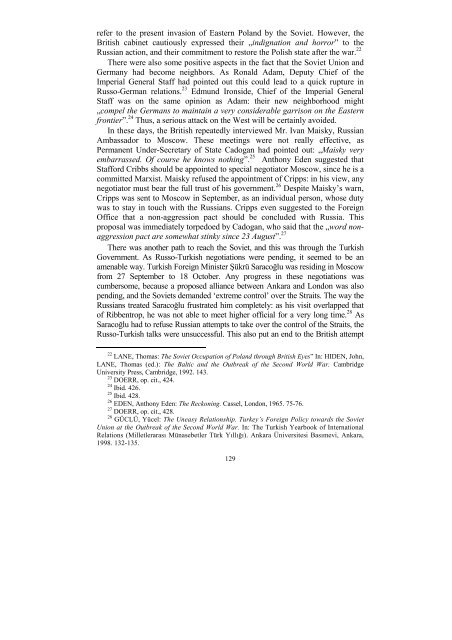The Molotov-Ribbentrop Pact - ELTE BTK Történelem Szakos Portál
The Molotov-Ribbentrop Pact - ELTE BTK Történelem Szakos Portál
The Molotov-Ribbentrop Pact - ELTE BTK Történelem Szakos Portál
You also want an ePaper? Increase the reach of your titles
YUMPU automatically turns print PDFs into web optimized ePapers that Google loves.
efer to the present invasion of Eastern Poland by the Soviet. However, the<br />
British cabinet cautiously expressed their „indignation and horror” to the<br />
Russian action, and their commitment to restore the Polish state after the war. 22<br />
<strong>The</strong>re were also some positive aspects in the fact that the Soviet Union and<br />
Germany had become neighbors. As Ronald Adam, Deputy Chief of the<br />
Imperial General Staff had pointed out this could lead to a quick rupture in<br />
Russo-German relations. 23 Edmund Ironside, Chief of the Imperial General<br />
Staff was on the same opinion as Adam: their new neighborhood might<br />
„compel the Germans to maintain a very considerable garrison on the Eastern<br />
frontier”. 24 Thus, a serious attack on the West will be certainly avoided.<br />
In these days, the British repeatedly interviewed Mr. Ivan Maisky, Russian<br />
Ambassador to Moscow. <strong>The</strong>se meetings were not really effective, as<br />
Permanent Under-Secretary of State Cadogan had pointed out: „Maisky very<br />
embarrassed. Of course he knows nothing”. 25 Anthony Eden suggested that<br />
Stafford Cribbs should be appointed to special negotiator Moscow, since he is a<br />
committed Marxist. Maisky refused the appointment of Cripps: in his view, any<br />
negotiator must bear the full trust of his government. 26 Despite Maisky’s warn,<br />
Cripps was sent to Moscow in September, as an individual person, whose duty<br />
was to stay in touch with the Russians. Cripps even suggested to the Foreign<br />
Office that a non-aggression pact should be concluded with Russia. This<br />
proposal was immediately torpedoed by Cadogan, who said that the „word nonaggression<br />
pact are somewhat stinky since 23 August”. 27<br />
<strong>The</strong>re was another path to reach the Soviet, and this was through the Turkish<br />
Government. As Russo-Turkish negotiations were pending, it seemed to be an<br />
amenable way. Turkish Foreign Minister Şükrü Saracoğlu was residing in Moscow<br />
from 27 September to 18 October. Any progress in these negotiations was<br />
cumbersome, because a proposed alliance between Ankara and London was also<br />
pending, and the Soviets demanded ‘extreme control’ over the Straits. <strong>The</strong> way the<br />
Russians treated Saracoğlu frustrated him completely: as his visit overlapped that<br />
of <strong>Ribbentrop</strong>, he was not able to meet higher official for a very long time. 28 As<br />
Saracoğlu had to refuse Russian attempts to take over the control of the Straits, the<br />
Russo-Turkish talks were unsuccessful. This also put an end to the British attempt<br />
22 LANE, Thomas: <strong>The</strong> Soviet Occupation of Poland through British Eyes” In: HIDEN, John,<br />
LANE, Thomas (ed.): <strong>The</strong> Baltic and the Outbreak of the Second World War. Cambridge<br />
University Press, Cambridge, 1992. 143.<br />
23 DOERR, op. cit., 424.<br />
24 Ibid. 426.<br />
25 Ibid. 428.<br />
26 EDEN, Anthony Eden: <strong>The</strong> Reckoning. Cassel, London, 1965. 75-76.<br />
27 DOERR, op. cit., 428.<br />
28 GÜCLÜ, Yücel: <strong>The</strong> Uneasy Relationship. Turkey’s Foreign Policy towards the Soviet<br />
Union at the Outbreak of the Second World War. In: <strong>The</strong> Turkish Yearbook of International<br />
Relations (Milletlerarası Münasebetler Türk Yıllığı). Ankara Üniversitesi Basımevi, Ankara,<br />
1998. 132-135.<br />
129













